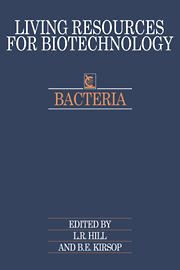Book contents
3 - Administration and safety
Published online by Cambridge University Press: 04 August 2010
Summary
Administration
Supply of cultures
The aim of service culture collections is to supply authenticated cultures to bona fide scientists, on request, promptly and without restriction on their ultimate use. The supply of certain bacteria such as pathogens (plant, animal or human) or patent strains will, however, be subject to statutory regulations and collections may impose further conditions. These may include, for example, proof that the requesting scientist holds the appropriate licence or permit to work with the cultures requested; that the request or order for cultures bears an authorised signature; and that an appropriate import licence is held. Supply of cultures to and from different countries, if pathogenic to man or animals, is subject to the International Air Transport Association (IATA) regulations whether sent by post or by air-freight. While the culture collection will effect the despatch of cultures as quickly as possible, delay can occur if those requesting the cultures are unaware of, or attempt to ignore, regulations. The collections, however, can only operate within the regulations.
Location of strains
The primary information about cultures available from a particular collection will be found in its printed catalogue. These, however, are not published as frequently as, say, catalogues of commercial suppliers of chemicals or equipment and so are never fully up-to-date. Many catalogues are now held on computers, and this enables quick and continual up-date by the collection and, in some cases, can be made available on-line (see Chapter 2).
- Type
- Chapter
- Information
- Bacteria , pp. 49 - 61Publisher: Cambridge University PressPrint publication year: 1991

